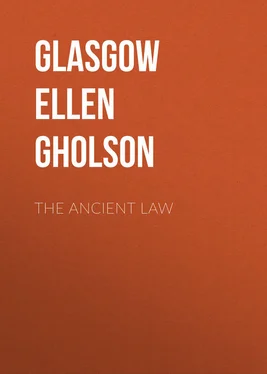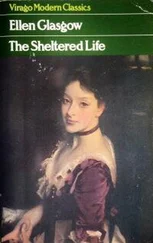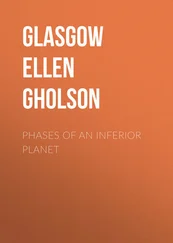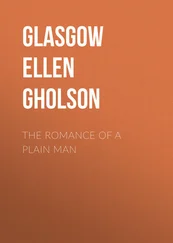Ellen Glasgow - The Ancient Law
Здесь есть возможность читать онлайн «Ellen Glasgow - The Ancient Law» — ознакомительный отрывок электронной книги совершенно бесплатно, а после прочтения отрывка купить полную версию. В некоторых случаях можно слушать аудио, скачать через торрент в формате fb2 и присутствует краткое содержание. Жанр: foreign_antique, foreign_prose, на английском языке. Описание произведения, (предисловие) а так же отзывы посетителей доступны на портале библиотеки ЛибКат.
- Название:The Ancient Law
- Автор:
- Жанр:
- Год:неизвестен
- ISBN:нет данных
- Рейтинг книги:3 / 5. Голосов: 1
-
Избранное:Добавить в избранное
- Отзывы:
-
Ваша оценка:
- 60
- 1
- 2
- 3
- 4
- 5
The Ancient Law: краткое содержание, описание и аннотация
Предлагаем к чтению аннотацию, описание, краткое содержание или предисловие (зависит от того, что написал сам автор книги «The Ancient Law»). Если вы не нашли необходимую информацию о книге — напишите в комментариях, мы постараемся отыскать её.
The Ancient Law — читать онлайн ознакомительный отрывок
Ниже представлен текст книги, разбитый по страницам. Система сохранения места последней прочитанной страницы, позволяет с удобством читать онлайн бесплатно книгу «The Ancient Law», без необходимости каждый раз заново искать на чём Вы остановились. Поставьте закладку, и сможете в любой момент перейти на страницу, на которой закончили чтение.
Интервал:
Закладка:
"What do you want? Say it quick – I've no time to talk," he began, as he pushed the last heap of papers inside, and let the lid of his desk fall with a bang.
"I'm looking for work," said Ordway, "and I was told at Baxter's warehouse – "
"Darn Baxter. What kind of work do you want?"
"I'll take anything – I can do bookkeeping or – "
"Well, I don't want a bookkeeper."
He locked his desk, and turning to take down his hat, was incensed further by discovering that it was not on the hook where he had placed it when he came in. Finding it at last on a heap of reports in the corner, he put it on his head and stared at Ordway, with his angry eyes.
"You must have come a long way – haven't you? Mostly on foot?"
"A good distance."
"Why did you select Tappahannock? Was there any reason?"
"I wanted to try the town, that was all."
"Well, I tell you what, my man," concluded the manager, while his rage boiled over in the added instants of his delay; "there have been a blamed sight too many of your kind trying Tappahannock of late – and the best thing you can do is to move on to a less particular place. When we want bookkeepers here we don't pick 'em up out of the road."
Ordway swallowed hard, and his hands clinched in a return of one of his boyish spasms of temper. His vision of the new life was for an instant defaced and clouded; then as he met the angry little eyes of the man before him, he felt that his rage went out of him as suddenly as it had come. Turning without a word, he passed through the entrance and out into the road, which led back, by groups of negro hovels, into the main street of the town.
His anger gave place to helplessness; and it seemed to him, when he reached presently the larger dwellings upon the hill, and walked slowly past the squares of light that shone through the unshuttered windows, that he was more absolutely alone than if he had stood miles away from any human habitation. The outward nearness had become in his thoughts the measure of the inner distance. He felt himself to be detached from humanity, yet he knew that in his heart there existed a stronger bond than he had ever admitted in the years of his prosperity. The generous impulses of his youth were still there, but had not sorrow winnowed them from all that was base or merely selfish? Was the lesson that he had learned in prison to be wholly lost? Did the knowledge he had found there count for nothing in his life – the bitterness of shame, the agony of remorse, the companionship with misery? He remembered a Sunday in the prison when he had listened to a sermon from a misshapen little preacher, whose face was drawn sideways by a burn which he had suffered during an epileptic seizure in his childhood. In spite of his grotesque features the man had drawn Ordway by some invisible power which he had felt even then to be the power of faith. Crippled, distorted, poorly clad, the little preacher, he felt, had found the great possession which he was still seeking – this man believed with a belief that was larger than the external things which he had lost. When he shut his eyes now he could still see the rows of convicts in the chapel, the pale, greenish light in which each face resembled the face of a corpse, the open Bible in its black leather binding, and beside it the grotesque figure of the little preacher who had come, like his Master, to call not the righteous but sinners to repentance.
The sun had dropped like a ball below the gray horizon, and the raw March wind, when it struck him now, brought no longer the exhilaration of the afternoon. A man passed him, comfortable, well-fed, wheezing slightly, with his fat neck wrapped in a woollen muffler, and as he stopped before a whitewashed gate, which opened into the garden surrounding a large, freshly painted house, Ordway touched his arm and spoke to him in a voice that had fallen almost to a whisper.
At his words, which were ordinary enough, the man turned on him a face which had paled slightly from surprise or fear. In the twilight Ordway could see his jaw drop while he fumbled awkwardly with his gloved hands at the latch of the gate.
"I don't know what you mean – I don't know" he repeated in a wheezing voice, "I'm sorry, but I really don't know," he insisted again as if in a helpless effort to be understood. Once inside the garden, he closed the gate with a bang behind him, and went rapidly up the gravelled walk to the long piazza where the light of a lamp under a red shade streamed through the open door.
Turning away Ordway followed the street to the end of the town, where it passed without distinct change of character into the country road. On this side the colour of the soil had paled until it looked almost blanched under the rising moon. Though the twilight was already in possession of the fields a thin red line was still visible low in the west, and beneath this the scattered lights in negro cabins shone like obscure, greenish glow-worms, hidden among clumps of sassafras or in stretches of dried broomsedge. As Ordway looked at these humble dwellings, it seemed to him that they might afford a hospitality denied him by the more imposing houses of the town. He had already eaten of the Negro's charity, and it was possible that before dawn he might be compelled to eat of it again.
Beneath his feet the long road called to him as it wound a curving white line drawn through the vague darkness of the landscape. Somewhere in a distant pasture a bull bellowed, and the sound came to him like the plaintive voice of the abandoned fields. While he listened the response of his tired feet to the road appeared to him as madness, and stopping short, he turned quickly and looked back in the direction of Tappahannock. But from the spot on which he stood the lights of the town offered little promise of hospitality, so after an uncertain glance, he moved on again to a bare, open place where two roads met and crossed at the foot of a blasted pine. A few steps farther he discovered that a ruined gate stood immediately on his right, and beyond the crumbling brick pillars, he made out dimly the outlines of several fallen bodies, which proved upon nearer view to be the prostrate forms of giant cedars. An avenue had once led, he gathered, from the gate to a house situated somewhere at the end of the long curve, for the great trees lying across the road must have stood once as the guardians of an estate of no little value. Whether the cedars had succumbed at last to age or to the axe of the destroyer, it was too dark at the moment for him to ascertain; but the earth had claimed them now, magnificent even in their ruin, while under the dim tent of sky beyond, he could still discern their living companions of a hundred years. So impressive was the past splendour of this approach that the house seemed, when he reached it, almost an affront to the mansion which his imagination had reared. Broad, low, built of brick, with two long irregular wings embedded in English ivy, and a rotting shingled roof that sloped over dormered windows, its most striking characteristic as he first perceived it under the moonlight was the sentiment which is inevitably associated with age and decay. Never imposing, the dwelling was now barely habitable, for the roof was sagging in places over the long wings, a chimney had fallen upon one of the moss-covered eaves, the stone steps of the porch were hollowed into dangerous channels, and the ground before the door was strewn with scattered chips from a neighbouring wood pile.
The air of desolation was so complete that at first Ordway supposed the place to be uninhabited, but discovering a light presently in one of the upper windows, he ascended the steps and beat with the rusted knocker on the panel of the door. For several minutes there was no answer to his knock. Then the sound of shuffling footsteps reached him from the distance, drawing gradually nearer until they stopped immediately beyond the threshold.
Читать дальшеИнтервал:
Закладка:
Похожие книги на «The Ancient Law»
Представляем Вашему вниманию похожие книги на «The Ancient Law» списком для выбора. Мы отобрали схожую по названию и смыслу литературу в надежде предоставить читателям больше вариантов отыскать новые, интересные, ещё непрочитанные произведения.
Обсуждение, отзывы о книге «The Ancient Law» и просто собственные мнения читателей. Оставьте ваши комментарии, напишите, что Вы думаете о произведении, его смысле или главных героях. Укажите что конкретно понравилось, а что нет, и почему Вы так считаете.












